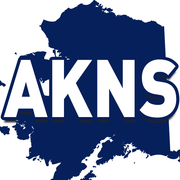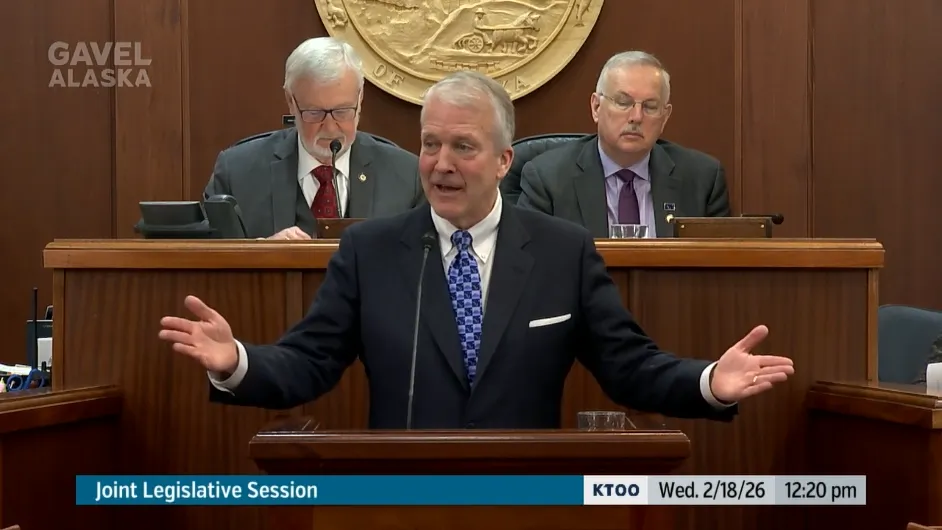The Legislature's two overrides were a truly remarkable rebuke of veto-happy Dunleavy
The veto has been one of Dunleavy's favorite tools for interfacing with the Legislature. It finally ran out.

It's Monday, Alaska!
In this edition: They kept us guessing until the last minute, but just enough legislators voted in favor of overriding Gov. Mike Dunleavy's landmark veto of public school funding this weekend on the first day of what will technically be a 30-day special session. The vote restores $50 million to the state's base student allocation, more than $200 for every student in the state and brings funding roughly in line with last year's budget. In the big picture, it marks the latest embarrassing misfire for the governor, whose liberal use of the veto pen and the high bar to override it has been his go-to tool in his legislative toolbox. Oh, and legislators also overrode his veto of a transparency bill aimed at getting to the bottom of his administration's suspiciously secretive handling of oil and gas taxes.
Current mood: ⚾
The Legislature's two overrides were a truly remarkable rebuke of veto-happy Dunleavy

With no votes to spare, the Alaska Legislature this weekend voted to override the governor's landmark veto of the state's baseline education funding levels, marking the first time in nearly four decades that legislators have met the tremendously high hurdle of overriding a governor's budget veto. As Senate President Gary Stevens said following the vote, it was "a remarkable day." For some context, Republican Gov. Mike Dunleavy has wielded the veto pen freely – and sometimes gleefully – during his time in office, frequently claiming that the founders of the state's constitution wanted precisely this – an all-powerful executive – when they set the highest-in-the-nation three-quarters (45 votes) threshold to override a spending veto. As long as 16 Republicans were on his side with budget vetos – and 21 on his side for policy bills, where 40 votes are needed to override – there wasn't much that legislators could do to get things past. And with a governor who hasn't seemed particularly willing to compromise with the Legislature – as evidenced by the fact that the expansion of charter schools is still on his asking list unchanged despite legislators rejecting it several times now – the veto has been one of the governor's most effective tools for bringing a Legislature that has been increasingly at odds with his agenda to heel.
His veto power – and the near-certainty that they can't override it – has stymied legislators' efforts to do things like institute limits on political contributions, bring back a pension system for public sector employees (who don't get Social Security in Alaska) and, until this year, make a significant increase to baseline school funding. His blanket promise to veto any and all new revenue measures has also left the state essentially stuck in neutral as it slides off the fiscal cliff.
But after years of his stubborn refusal to meaningfully negotiate with legislators, it appears the reflexive loyalty among Republican legislators has a limit. A year after 17 Republicans flip-flopped on the governor's BSA veto – an ill-informed move that spared Dunleavy from vetoing the BSA but helped flip the House from a Republican majority to a coalition majority – just one flipped on Saturday. Ten legislators of the typically Dunleavy-aligned Republican minorities remained committed to their votes, securing the override; they are Reps. Bynum, Coulombe, Elam, Nelson, Ruffridge, Saddler, Stapp and Sens. Cronk, Kaufman and Yundt. They, by and large, seem to understand that the governor's position of leveraging essential school funding for increasingly questionable policies is out of step with the voters. House Minority Leader Rep. Mia Costello, who represents a purple district in West Anchorage that Democrats are keen on flipping, was the lone legislator to abandon her prior vote to increase school funding.
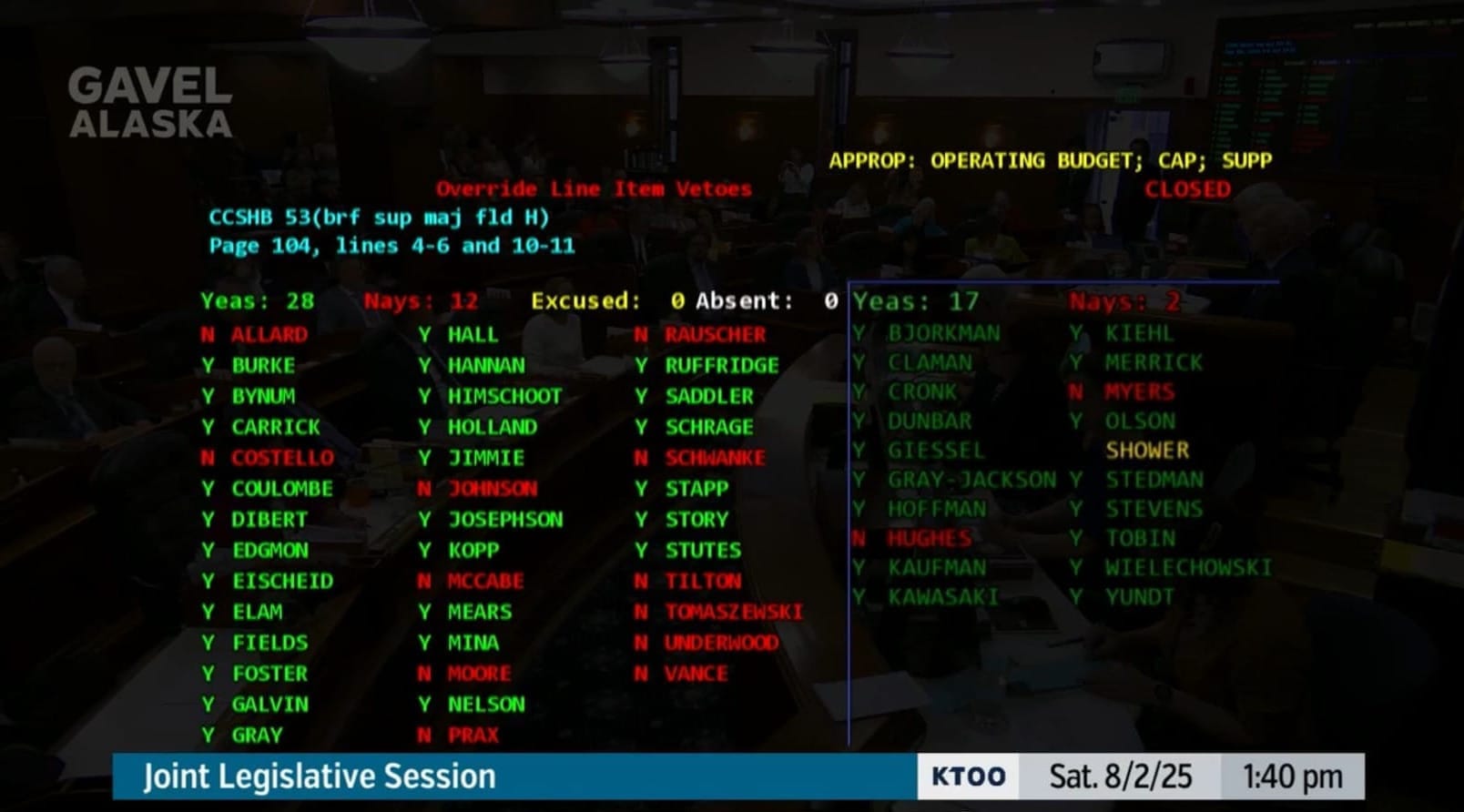
The override restores $50 million for K-12 schools – a minimum of $200 per student and nearly $3,000 for intensive needs students, and even more for students in districts with higher costs of living than Anchorage (everywhere) – just days before the start of the school year, a move officials say will help avoid some of the worst cutbacks they were forced to consider in the wake of the governor's veto. If legislators had allowed the cut to stand, not only would it have been the first time in state history that it funded schools below the levels laid out in state law, but it would have amounted to a year-over-year cut for public schools.
"This is a pretty exciting day. It's the first time, I understand, in 37 years that the legislature has overridden an appropriation veto of the (sitting) governor," said Senate President Gary Stevens in a joint news conference following the votes. "I heard someone on the floor of the House today thank the governor for calling us in. I, too, want to thank him for calling us in. If we hadn't had this opportunity to override, we would have had to wait 'til January."
If that sounds a little pointed, that's because it is.
Legislative leadership has not been shy about their exasperation with Dunleavy and his administration, casting him at best as disconnected and disinterested in the legislative process (a big shock after a wholly underwhelming stint as a legislator) and at worst as underhanded and petty.
The timing of the legislative session was particularly suspect because it overlapped with several legislators' pre-planned commitments out of state, including Sen. Forrest Dunbar's deployment with the Alaska Army National Guard in Europe. Ostensibly, the special session was about education policy, but it was clearly about forcing legislators into a vote when not everyone could be there, a point reinforced by Dunleavy telling allied legislators to boycott the start of the session (an order he'd later retract). All legislators except Sen. Mike Shower ultimately made it to Juneau for the special session, including Dunbar, who secured leave from his deployment and returned to Alaska on his own dime (interestingly, Rep. Costello raised the possibility of canceling the special session after it came out that he could attend, accurately noting the session wasn't the best way to get traction).

At the post-vote news conference, legislative leadership of the House and Senate multipartisan coalition majorities was candid about the increasingly rocky relationship between the Dunleavy administration and the Legislature.
"It's been difficult," said Senate President Gary Stevens. "The governor has not been here for his last two years; we've not been able to engage him. His staff, we've worked through on education issues, for them only to decide that they don't want to do that and, after a lot of discussion, vetoed those issues. Our doors are open. The Legislature certainly wants to include the governor. We want to know what he wants to do. ... We're ready to work with him. I hope he's ready to work with us."
Judging by the governor's characteristically churlish hour-long news conference after the veto – including broad dismissals of legislators' concerns, a couple of swipes at the media, Trump praise and stark lack of vision for a path forward – it doesn't sound like it.
Or, in fewer words:
#akleg Good job everyone. You defeated the Veto Monster.
— Pat Race (@pat.alaskarobotics.com) 2025-08-04T06:36:12.649Z
On oil tax transparency and other overrides that weren't
The rebuff of the governor didn't stop there, though it also didn't go much further.
Legislators also overrode the governor's veto of Senate Bill 183, a measure that seeks to get to the bottom of the governor's suspiciously secretive handling of oil and gas tax assessments. As a bit of background, the state's complicated oil tax system includes a lengthy audit process to ensure the deductions claimed by the producers are legitimate, traditionally yielding big multimillion-dollar bills. Those assessments are settled in an often-contentious process whose outcome really relies on the administration's willingness to go to the mat for what the state is due.
Those payments, as you could probably have surmised, have dropped precipitously under the pro-industry Dunleavy administration, raising concerns among legislators that he could be taking an overly industry-friendly approach at the cost of the state. Admittedly, malfeasance isn't the only explanation, and there are other arcane tax reasons the settlements dropped off, but either way, it's something that lawmakers should know. Still, if they're not doing something untoward, all the stonewalling of the legislative auditor is certainly eyebrow-raising. It's also curious that Revenue Commissioner Adam Crum, who is also accused of being a central figure in both taking a purportedly industry-friendly stance and in stonewalling legislators, recently announced he's quitting.
While Dunleavy has accused legislators of inventing wrongdoing where there is none, his administration also tried to convince legislators to call off the veto override by claiming that there has been some kind of misunderstanding.
Legislators have remained unconvinced.
While legislators could have taken up other vetoes, such as his veto of police dog health care, limits on payday loans or funding for child care and infant learning, they said they didn't believe they had the votes to reach the 40-vote threshold needed. That would seem to suggest that minority Republicans were less willing to break from the governor on those issues – the police dog bill, for example, passed with 52 votes, meaning that at least a dozen votes had to be in question for the override not to be certain.
An end date uncertain
The House and Senate also closed out the session by approving resolutions that allow them to keep the session open without meeting in person every three days. While leadership said it will let them maintain maximum flexibility in case something comes up (it won't), it also blocks the governor from calling back into a special session immediately.
Follow the thread: The Legislative joint session on veto overrides
More coverage
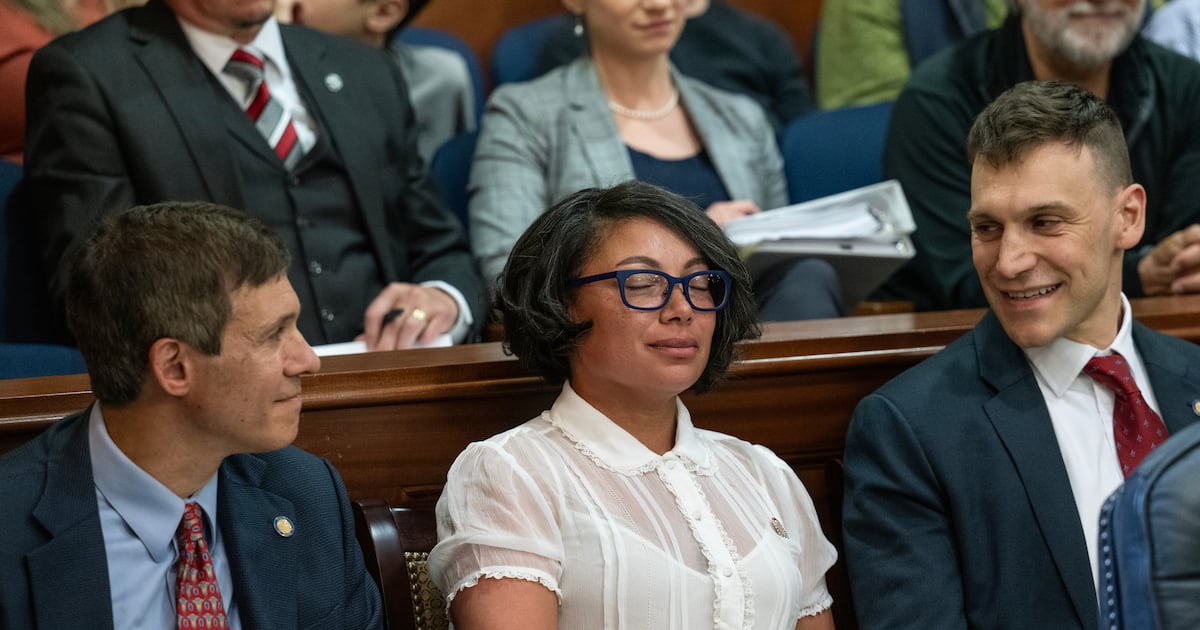
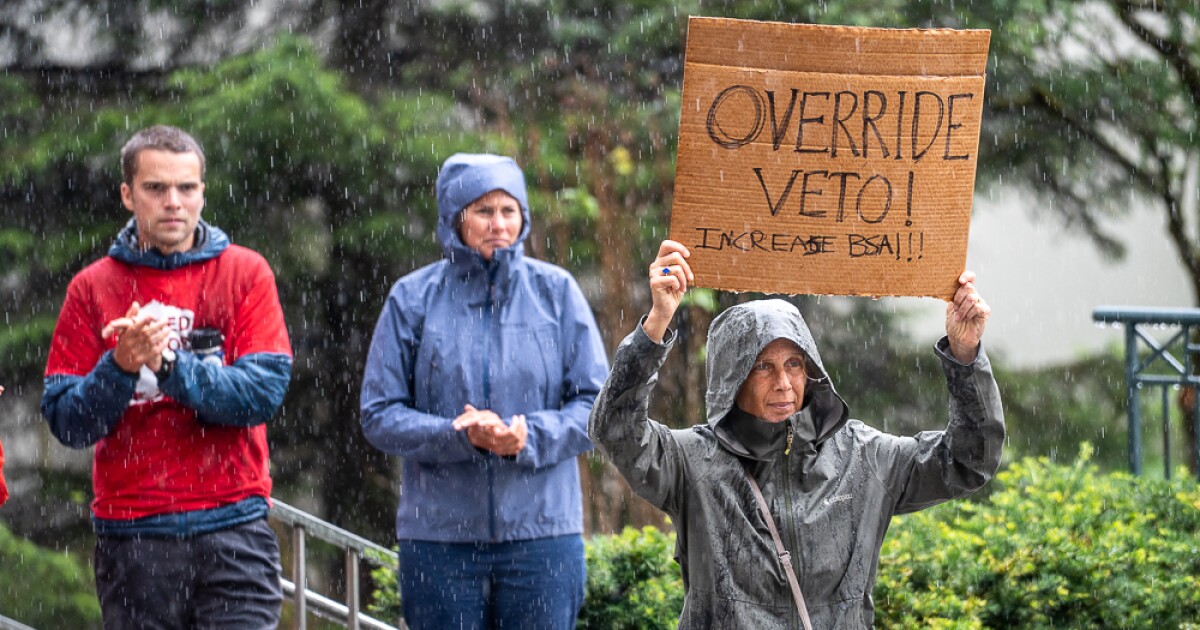
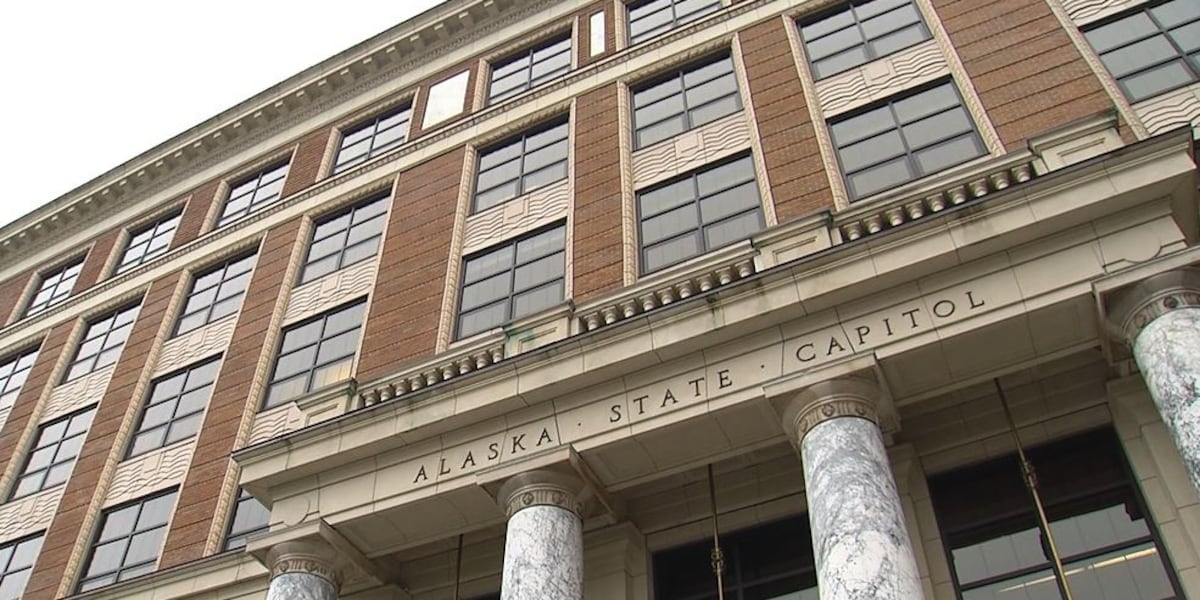

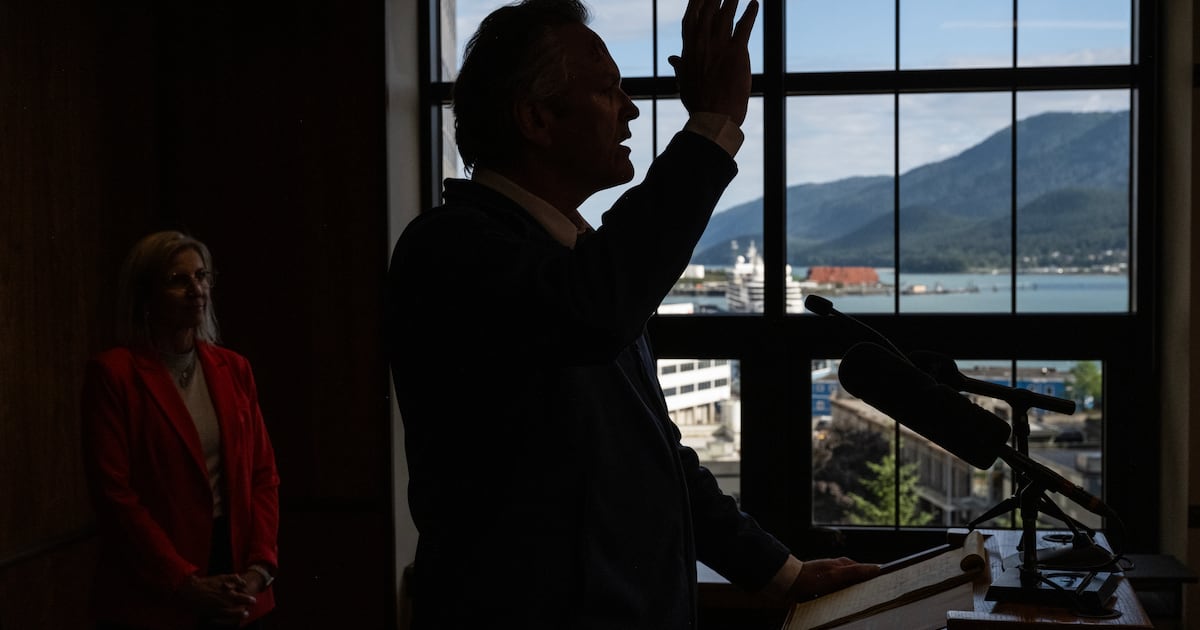
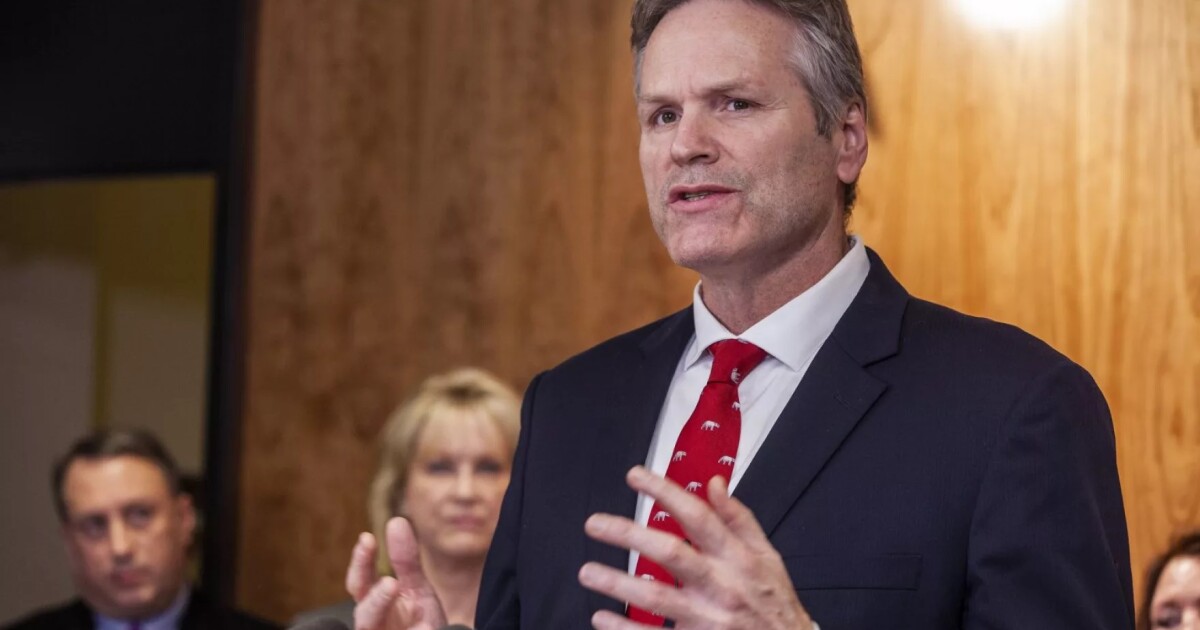
The Alaska Memo Newsletter
Join the newsletter to receive the latest updates in your inbox.



